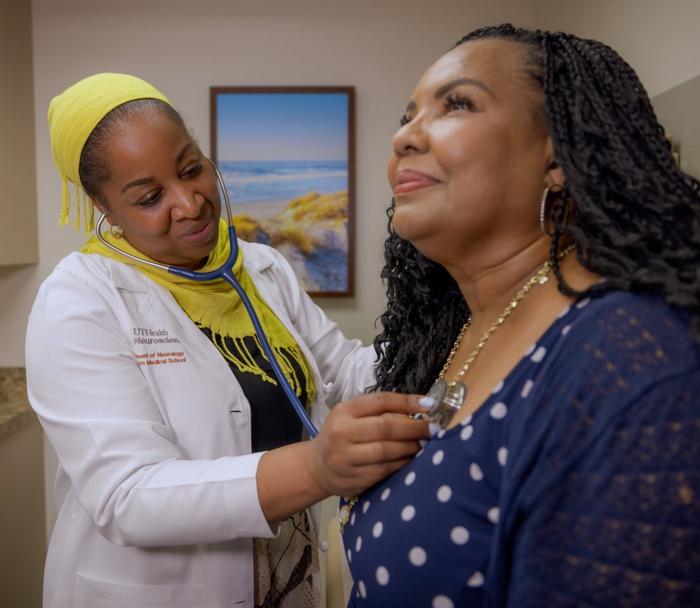
In a groundbreaking initiative aimed at addressing disparities in neurological outcomes, UTHealth Houston has secured a significant grant of $2.9 million from the National Institutes of Health (NIH). This ambitious project is designed to enhance the inclusivity and effectiveness of clinical trials for neurological conditions that currently affect underserved populations. The project recognizes the vital importance of community engagement and aims to establish a framework for research interventions focused on critical neurologic issues, including conditions such as stroke, Parkinson’s disease, and vascular cognitive impairment, along with dementia.
Neurological disorders remain some of the leading causes of death and long-term disability across the United States, yet the participation of diverse communities in clinical research has historically been limited. Principal investigator Anjail Sharrief, MD, MPH, emphasizes that the absence of diverse voices in clinical trials has contributed to inequitable health outcomes. “When clinical trials are developed without considering the perspectives of the communities most affected, we fail to capture the complexities and realities of those populations,” Sharrief explains. By prioritizing community input from the outset, the project seeks to ensure that research findings are reflective of a broader patient demographic.
One of the key components of this initiative is the establishment of a Brain Health Equity Collaborative. This consortium will facilitate partnerships between academic institutions and community organizations, creating synergies that promote the inclusivity of future clinical trials. It is anticipated that a community advisory board will play a vital role in reviewing various operational aspects of the trials, including consent forms and assessment tools. Such scrutiny ensures that research methodologies resonate with participants, thereby enhancing recruitment and retention rates.
Sharrief’s approach recognizes that logistical barriers often hinder participation from lower-income populations. Clinical trials traditionally require participants to attend in-person consultations during standard work hours, which can be a significant barrier to individuals who may forfeit wages as a result. The proposed initiative will explore options for telemedicine, allowing participants to engage in follow-up visits remotely, ultimately alleviating the burden of travel and time off work. Sharrief insists that building flexibility into trial protocols is essential for widening participation, thereby enriching the data collected from a diverse array of patients.
The project is particularly exciting because it intertwines the passions of researchers for scientific inquiry with a commitment to social justice. By addressing the inherent biases in clinical research, UTHealth is setting a precedent that other institutions may follow. Co-investigators in this project are distinguished experts in the field of neurology and biostatistics, all committed to ensuring that the perspectives and needs of underserved communities are prioritized in the research process.
Furthermore, partnerships with local organizations will enhance outreach and engagement efforts. Collaborators like ProSalud, African American Male Wellness Agency, and the Christopher Pichon II Foundation will amplify the message and enhance the project’s impact, making research more accessible to those who have traditionally been overlooked. These partnerships are critical for fostering trust within communities that may harbor skepticism regarding medical research due to historical injustices.
In designing this innovative trial framework, researchers are aware of the critical need for cultural competence and relatability in all communications involved in the research process. Community oversight committees will be deployed to provide ongoing feedback from patients and caregivers alike, ensuring that their voices are integral to the shape and direction of the trials. “If a community feels engaged and their input is genuinely valued, they are more likely to participate,” Sharrief notes.
The funding from the National Institute of Neurological Disorders and Stroke, part of the NIH, underscores the government’s commitment to advancing health equity within clinical research. The comprehensive strategy envisioned by the UTHealth Houston team aligns with contemporary public health objectives that emphasize inclusivity and accessibility in medical research, challenging institutions to reconsider longstanding paradigms that have marginalized certain groups.
Moreover, the infrastructure being built through this program not only aims to improve participation rates in clinical trials but also seeks to empower communities by offering educational resources. This will foster a better understanding of neurological conditions, emphasizing prevention, risk factors, and available treatment options. It’s a holistic approach that recognizes that scientific advancement is most meaningful when it is inclusive and equitable.
In a society where the burden of disease is often inequitably distributed, this initiative may represent a pivotal shift in how neurological research is conducted. By ensuring that trials are accessible, relatable, and designed with community needs in mind, UTHealth is not just advancing scientific knowledge — it is redefining who benefits from that knowledge.
Participants in such trials will not only contribute to research; they will serve as vital agents of change, advocating for their communities and driving conversations about health equity forward. The potential for this project to alter the landscape of neurological research is profound, creating a model that could be replicated in other areas of medicine, where disparities persist.
As the project unfolds, the eyes of the academic and medical communities will be watching closely. The outcomes of this initiative may determine how future research is framed and conducted, setting an example in prioritizing community engagement, inclusivity, and social responsibility within the realm of clinical trials.
Through collaborative efforts and a steadfast commitment to equity, UTHealth Houston is not merely conducting research — it is nurturing a transformative paradigm that brings together science and social equity to create a healthier future for all populations.
Subject of Research: Neurological outcomes for underserved populations
Article Title: Bridging the Gap: Addressing Neurological Disparities Through Community Engagement in Clinical Trials
News Publication Date: [Not specified in the original content]
Web References: [Not specified in the original content]
References: [Not specified in the original content]
Image Credits: Credit: UTHealth Houston
Keywords: Health equity, clinical trials, neurological disorders, community engagement, stroke, Parkinson’s disease, dementia, health disparities, research infrastructure, biostatistics, academic partnerships, health outcomes.





